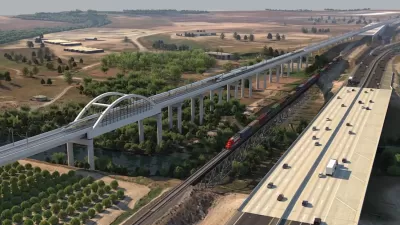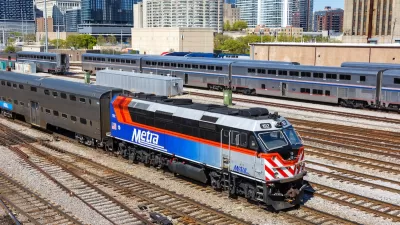A new report suggests that an overreliance on external consultants by U.S. transit agencies and other government entities is hollowing out the public sector and raising the costs of transit projects.

The high cost of building U.S. transit projects has been a hot topic as of late, even as transit services in most American cities remain inadequate. Writing in Slate, Henry Grabar outlines a new report from New York University’s Transit Costs Project that offers recommendations for how to bring down the cost of transit projects, “make it possible for America to build big again,” and rebuild faith in public transit and, perhaps, the public sector in general.
“According to authors Eric Goldwyn, Alon Levy, Elif Ensari, and Marco Chitti, there’s a lot going wrong with American transit projects—more on this in a moment—but many of the problems can be traced to a larger philosophy: outsourcing government expertise to a retainer of consultants.” From New York to California, consultant fees have consumed massive amounts of transit funding. Meanwhile, the report’s authors argue that relying so heavily on external support means agencies don’t hold on to institutional knowledge and skills that could be applied to future projects.
It’s that lack of institutional know-how, of which consultants are both a symptom and a cause, that really hampers projects. The lack of a good in-house team, for example, leads to farming out so-called ‘design-build’ contracts, which ultimately produces more expensive projects by offloading risk to contractors, who bid accordingly.
The report points out that the reliance on consultants isn’t the only factor driving up costs. “Transit routes picked at the ballot box are bound to be worse than those drawn up by experts; transit’s role as a ‘job creation’ bonanza doesn’t create incentives to be particularly efficient.” But the report draws attention to the larger lesson, also laid out in a forthcoming book by Mariana Mazzucato and Rosie Collington: “consultants have hollowed out government functions well beyond transit construction.” Author John Dilulio makes a similar argument, arguing that the shift to contractors “has created a federal apparatus that’s at once bigger, less efficient, and less accountable.”
FULL STORY: Consultants Gone Wild

Alabama: Trump Terminates Settlements for Black Communities Harmed By Raw Sewage
Trump deemed the landmark civil rights agreement “illegal DEI and environmental justice policy.”

Study: Maui’s Plan to Convert Vacation Rentals to Long-Term Housing Could Cause Nearly $1 Billion Economic Loss
The plan would reduce visitor accommodation by 25% resulting in 1,900 jobs lost.

Why Should We Subsidize Public Transportation?
Many public transit agencies face financial stress due to rising costs, declining fare revenue, and declining subsidies. Transit advocates must provide a strong business case for increasing public transit funding.

Wind Energy on the Rise Despite Federal Policy Reversal
The Trump administration is revoking federal support for renewable energy, but demand for new projects continues unabated.

Passengers Flock to Caltrain After Electrification
The new electric trains are running faster and more reliably, leading to strong ridership growth on the Bay Area rail system.

Texas Churches Rally Behind ‘Yes in God’s Back Yard’ Legislation
Religious leaders want the state to reduce zoning regulations to streamline leasing church-owned land to housing developers.
Urban Design for Planners 1: Software Tools
This six-course series explores essential urban design concepts using open source software and equips planners with the tools they need to participate fully in the urban design process.
Planning for Universal Design
Learn the tools for implementing Universal Design in planning regulations.
Caltrans
Smith Gee Studio
Institute for Housing and Urban Development Studies (IHS)
City of Grandview
Harvard GSD Executive Education
Toledo-Lucas County Plan Commissions
Salt Lake City
NYU Wagner Graduate School of Public Service





























